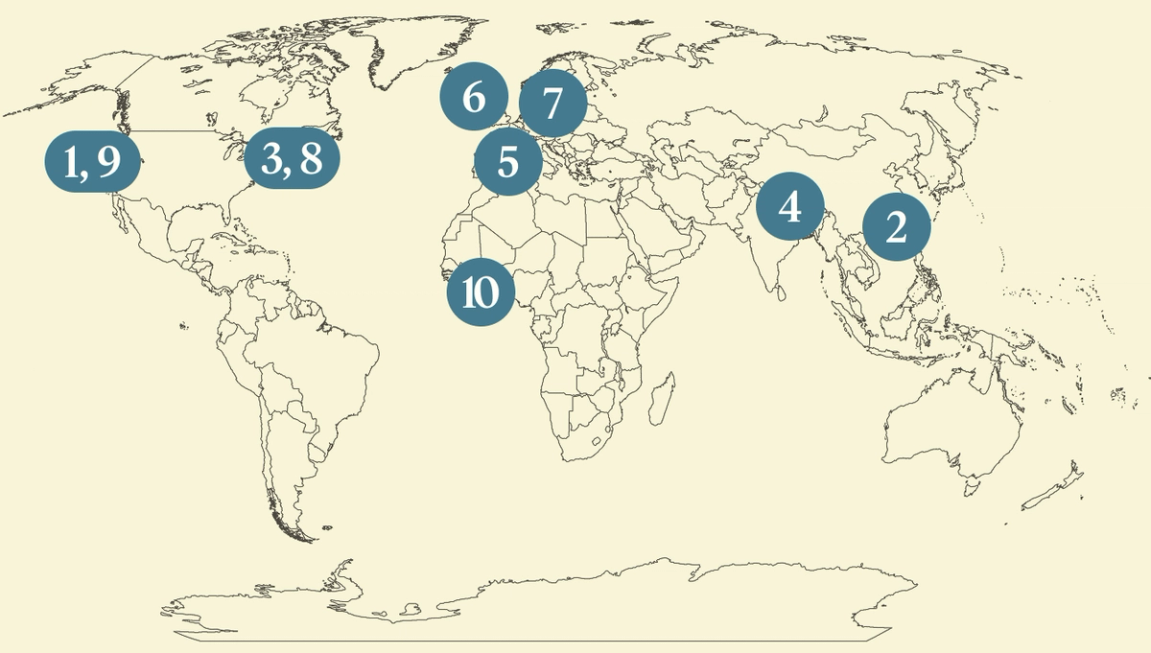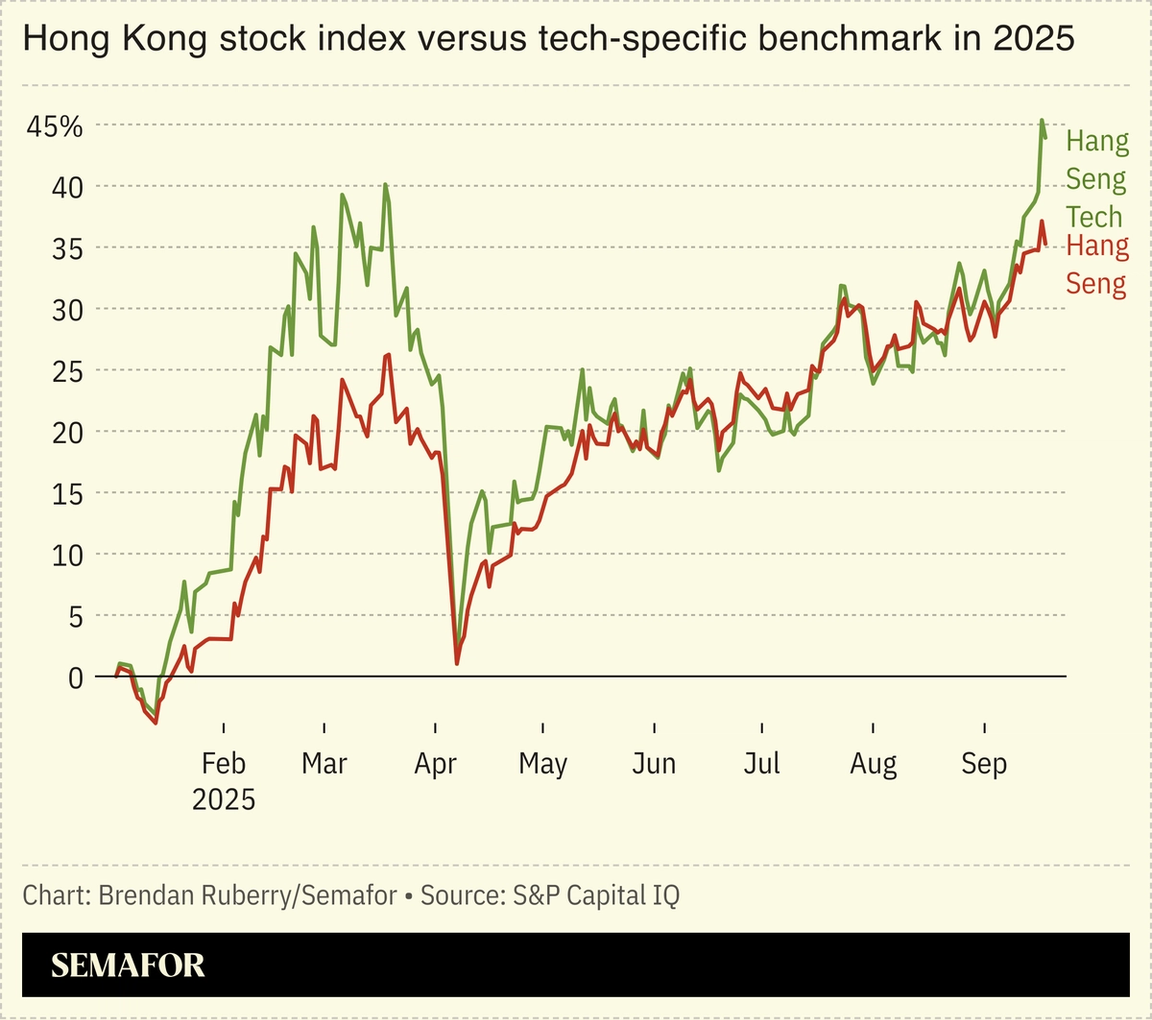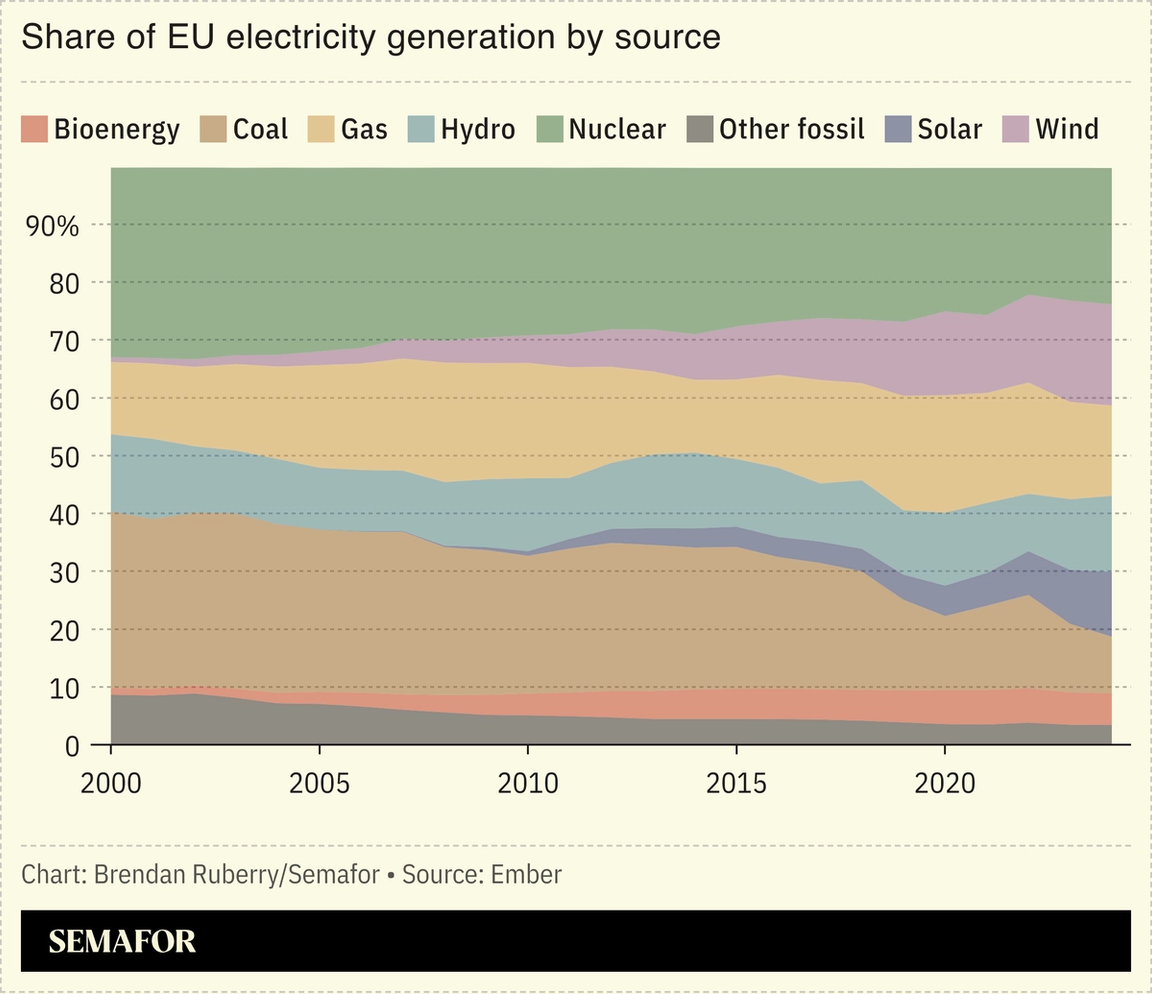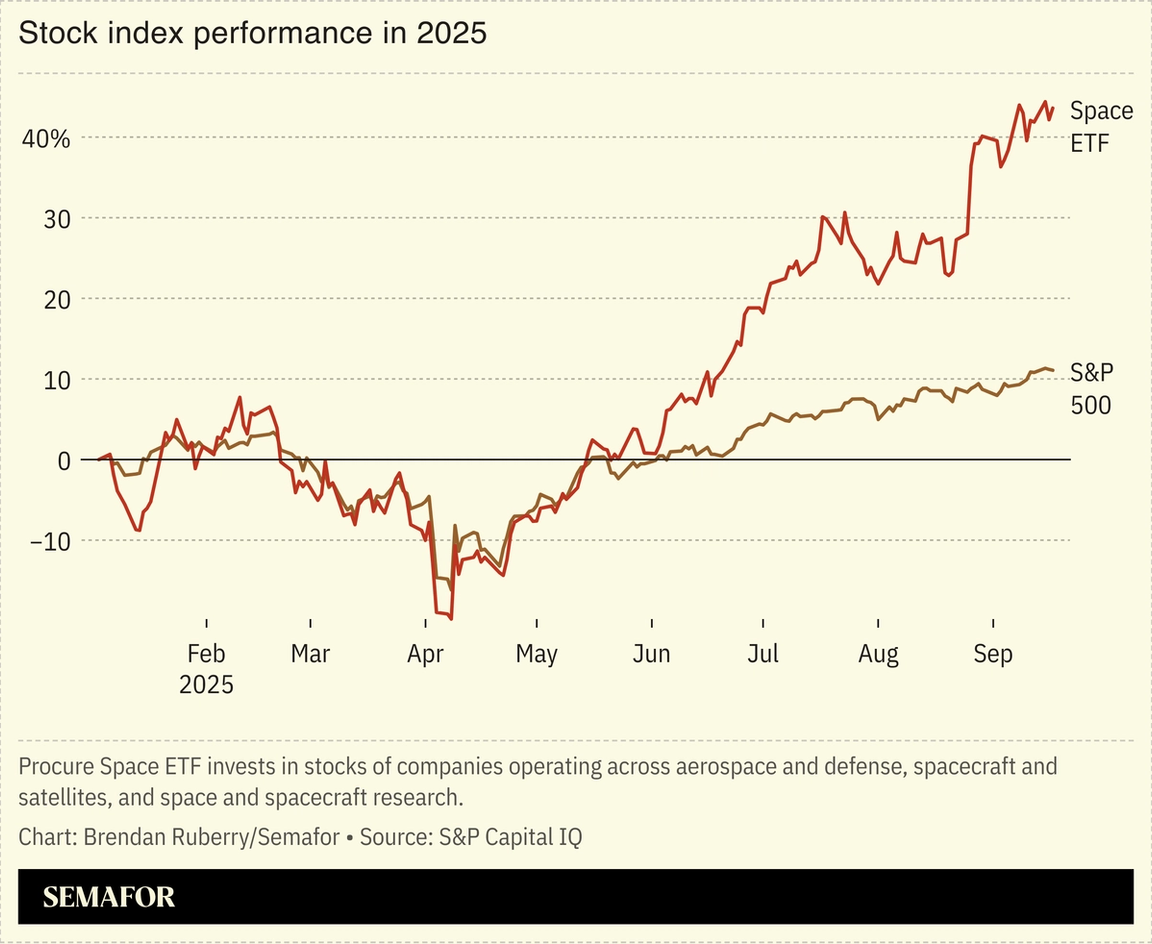| | Nvidia is investing in Intel, Mars is pivoting to Europe, and medical professionals are divided over͏ ͏ ͏ ͏ ͏ ͏ |
| |   PARIS PARIS |   YAMOUSSOUKRO YAMOUSSOUKRO |   HONG KONG HONG KONG |
 | Flagship |  |
| |
|
The World Today |  - Nvidia invests in Intel
- Huawei challenges Nvidia
- Trump’s speech crackdown
- Geopolitics on Discord
- Trump’s anti-ESG push in EU
- Mars turns to Europe
- Weaponizing space
- Luxury sector holds up
- AI psychosis debate
- Drunk chimps
 A Picasso unseen for 80 years is going on auction, and a 30-year-old AI founder is our latest Person of Interest. |
|
Nvidia to invest in rival Intel |
 Laure Andrillon/Reuters Laure Andrillon/ReutersNvidia will come to the aid of rival Intel, investing $5 billion in the struggling chip giant. Roughly $16 billion has been poured into Intel, first by the US government, then by SoftBank, and now Nvidia. “This has been a golden few weeks for Intel after years of pain and frustration for investors,” one analyst wrote. The partnership — which Nvidia and Intel were reportedly discussing before US President Donald Trump attacked Intel CEO Lip-Bu Tan in August — reflects the remarkable shift of power in the computer industry in the last few years, Bloomberg noted: “Intel is getting a financial shot in the arm… from a company that it once relegated to a niche role on the industry’s fringes.” |
|
China tech companies show off |
 China is hailing new AI chip advancements, as the country increasingly signals its desire to undercut US giant Nvidia. A day after Beijing banned certain Nvidia chips, Chinese tech giant Huawei — which has long been secretive about its chips business — announced long-term plans to build faster AI chips and “super clusters.” Tencent said it “fully adapted” its AI infrastructure to support domestic hardware, and another company touted a massive data center powered by homegrown chips. The firms’ “growing public swagger” has fueled a record tech rally in China, Bloomberg wrote, but it remains to be seen how their ambitions hold up: Nvidia remains so dominant that even AMD and Intel “are relegated to also-rans in the hot AI space.” |
|
Trump readies wider speech crackdown |
 Daniel Cole/Reuters Daniel Cole/ReutersUS President Trump reportedly plans to use tax and criminal probes to target left-wing groups he accuses of fomenting political violence, as the battle over speech metastasizes beyond media companies. The moves are part of a Republican-led crackdown against those critical of assassinated conservative activist Charlie Kirk: The country’s media regulator pressured ABC to pull late-night host Jimmy Kimmel off the air. Trump also floated revoking broadcast licenses for networks that are “against” him. Kimmel’s suspension sparked concerns of a new era of censorship. “For the MAGA crowd who might like what they’re seeing… Remember that Democrats will wield this power again,” The Free Press wrote. “And when they do, they will play by the new rules” that Trump established. |
|
Asia’s Gen Z asserts right to stay online |
 Adnan Abidi/Reuters Adnan Abidi/ReutersGovernments may be underestimating how much their authority is constrained by citizens’ desire to stay online. For younger generations, social media has become crucial for activism and expression — youth-led protests and riots in Nepal last week toppled the government in part over an unpopular ban on social media platforms; demonstrators used Discord to decide the country’s new leader. Online platforms have also helped recent anti-corruption protests in the Philippines gain steam. The unrest in Asia offers a cautionary tale to US President Donald Trump as he pursues a deal over TikTok that could require American users to shift to a new, US-only version of the app, internet-focused newsletter Garbage Day wrote. |
|
Exxon ‘pessimistic’ on EU climate talks |
 US President Donald Trump’s efforts to roll back Europe’s strict climate rules to benefit American fossil fuel firms haven’t yet paid off, ExxonMobil’s CEO said. Darren Woods told Semafor he has taken his complaints directly to Trump, but is “pessimistic” that the White House could score a breakthrough on behalf of US oil and gas companies. Trump has pushed for the EU to drop environmental regulations he sees as onerous, but some in Brussels see rules around corporate sustainability reporting “as fundamental to the EU’s long-term climate strategy,” Semafor’s climate and energy editor wrote. The EU may be betting that companies like Exxon will bite the regulatory bullet to sustain access to the European market. |
|
Mars eyes Europe amid slow US demand |
 Joaquin Gomez Sastre/NurPhoto via Getty Images Joaquin Gomez Sastre/NurPhoto via Getty ImagesMars, the confectionary maker, is investing more than $1 billion in European manufacturing, in part, because obesity drugs are slowing its US sales. The Snickers and M&Ms company has seen decades of US growth, but that is changing. Persistent inflation has made American consumers more cautious about spending, and growing health awareness, along with the popularity of GLP-1 drugs, have hit snack foods in particular. Mars’ CFO told the Financial Times that the company hopes to “rebalance” itself with a greater focus on Europe. The snack industry’s challenges may increase: Ozempic maker Novo Nordisk announced that its upcoming anti-obesity pill was nearly as effective as the injectable versions. |
|
Nations deepen space tech push |
 The world’s nations are racing to weaponize space, and tech and defense firms are jostling for the billions of dollars that will pour forth. A global move toward rearmament is happening in space, too: The S&P index tracking space companies has jumped 35% since April, largely off military investment. Space companies are pivoting from peaceful purposes such as climate monitoring to defense, and arms giants are investing in space tech. The money at stake is enormous, the Financial Times reported, as NATO’s spending pledge means there could be $2.7 trillion in new annual defense and security spending by 2035. The moves come as Russian and Chinese military satellites have been behaving in “unusual and potentially threatening ways” recently. |
|
 Dr. Tedros Adhanom Ghebreyesus, Director-General, World Health Organization, will join the stage at The Next 3 Billion — the premier US summit focused on closing the global digital divide. Semafor editors will sit down with global executives and thought leaders to highlight the economic, social, and global impact of bringing the next 3 billion people online. |
|
 Veronica Beard’s Stephanie Unwin. Daniel McKnight/Semafor Veronica Beard’s Stephanie Unwin. Daniel McKnight/SemaforThe luxury market is holding up — for now — in a US economy that’s increasingly bifurcating between the wealthy and everyone else. Industry leaders at Semafor’s Business of Luxury event Wednesday said tariffs are crimping margins and mucking up supply chains, but high-end consumers still crave an edge. “Being in the luxury tier definitely protects, to a point, compared to the lower price point,” the global CEO of José Andrés Group said. Fashion brand Veronica Beard is aggressively moving production out of China, but “we have seen no slowdown,” its president said. The tariffs’ impact is muted partly because luxury firms have room to maneuver, business leaders suggested. Small price adjustments won’t necessarily alienate customers who care more about exclusivity. |
|
Debate over ‘AI psychosis’ |
Medical experts are divided over whether AI chatbots have spawned a new kind of psychosis that should have its own diagnostic label. A recent New York Times report found a growing number of people are having “persuasive, delusional conversations” with bots like ChatGPT, in marathon messaging sessions that sometimes precede hospital admissions, arrests, or divorce. Chatbots are effectively “enabling AI psychosis,” The Verge wrote, using a descriptor that has caught on in recent weeks. Psychiatrists are concerned, though they are split over whether this is “a distinct phenomenon that deserves its own label, or a familiar problem with a modern trigger,” Wired reported, adding that clinicians are “flying blind” when it comes to treating AI-altered mental states. |
|
|